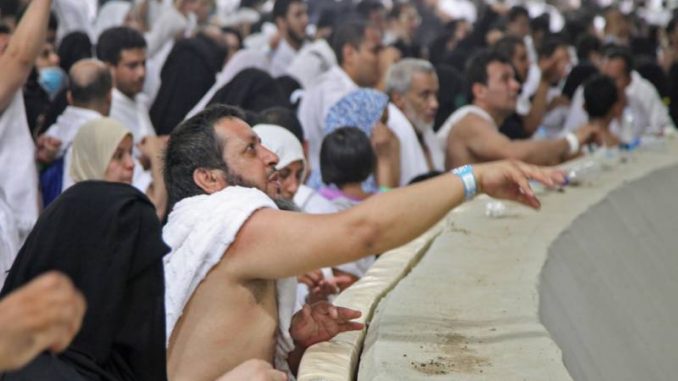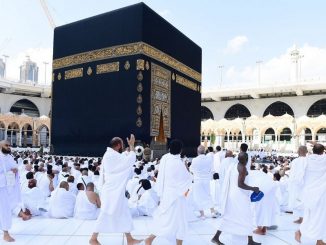
A Report on the issues of Hajj
By Sheikh Khalid Bin Abd Al Aziz Al Hueiseen , Compiled by: Abu Mujahed Al Maziani
Virtues of Hajj
First hadith on the virtues of Haj:
Narrated Abu Huraira:
The Prophet was asked, “Which is the best deed?” He said, “To believe in Allah and His Apostle.” He was then asked, “Which is the next (in goodness)?” He said, “To participate in jihad in Allah’s Cause.”
He was then asked, “Which is the next?” He said, “To perform sound and perfect Haj.”
We conclude from this hadith:
That the scholars collectively concluded from this hadith sahih that jihad is better than a voluntary Haj.
That nothing is more important than Islamic monotheism.
If jihad was a sure must on a Muslim and the Haj was voluntary, then the jihad comes before the Haj.
The virtues of these two acts (jihad and Haj), Imam Ahmad (may Allah have mercy on him) said: “In Haj there is hardship, fatigue and physical and financial efforts, so oh how great it is.”
He also said: In Haj there is a moment that no other moment could be compared with and that is standing in Arafah.
The sound and perfect Haj:
It is when the pilgrim does fully the duties expected of him during Haj as well as those preferred to be done and stayed away from the forbidden and the not preferred.
Insurance of the ancestors on performing Haj:
• Ibn Omar (may Allah be pleased with both of them) visited the Kabba 1000 times on Ummrah and 40 times on Haj.
• Sufian Al Thauri (may Allah have mercy on him) performed Haj 70 times.
• The khalifs performed Haj from the point they became khalifs until their deaths.
• Some of the ancestors performed Haj 80 times as recorded by Ibn Katheer in his book Bedaiyah wa Nihaya.
Sheikh Ibn Baaz (may Allah have mercy on him) 61 times.
Question:
If a pilgrim did the duties expected of him during the Haj but didn’t do those preferred to be done and stayed away from those forbidden and not preferred,
would his Haj be sound and perfect?
Answer:
Yes it will, but it will be more sound however if he did the preferred works as well.
The prophet (peace and blessings be upon him, his household and companions) listed that Haj comes after belief (iman) and jihad.
The second hadith on the blessings of Haj :
Narrated Abu Huraira (may Allah be pleased with him):
The Prophet (peace and blessings be upon him, his household and companions) said,
“Whoever performs Haj and does not approach his wife for sexual relations (yarfith) nor commit sins (yafsiq) (while performing Haj),
he will come out as sinless as a new-born child, (just delivered by his mother).”
We conclude from it:
This hadith is the most clear on the virtues of Haj.
1. His saying “and did not yarfith”: was interpreted as the intercourse or foreplay but the best interpretation is the one made by scholars in the language (Arabic) and from them Al Azhari as: All what a man wants from his wife.
And that only includes the normally permitted wants, thus the normally prohibited wants are much greatly prohibited during Haj.
His saying “and did not yafsik”: Al Fisook: is defined by scholars as going out to commit the forbidden (which means all types of sins).
The pilgrim gets no reward unless he avoids sexual relations with his wife as well as committing any
kind of sins.
The hadith is told in the Sahih “Whoever performs Haj and does not approach his wife for sexual relations (yarfith) nor commit sins (yafsiq) (while performing Haj),
he will come out as sinless as a new-born child, (just delivered by his mother).”
Does not have “from his sins” and it is a Sahih.6. His saying: “he will come out as sinless as a new-born child, (just delivered by his mother).”
Scholars have argued about it on two grounds: Is the forgiveness of sins for the minor sins (sagha’aer) only excluding the major ones (kaba’aer) or both of them together?
Most scholars said the forgiveness is for the minor sins only excluding the major ones.
Others said (including Al Qubruti in Understanding the Sahih and Hafez Bin Hajer):
Forgivness includes the minor sins as well as the major sins, even the consequences like backbiting and relating news of other people and that is the correct and most valid.
9. For more benefit: What are the acts that will bring forgiveness for the minor and major sins?
Three reports came on three acts:
i. Haj as reported in the hadith.
ii. Jihad in the name of Allah as reported by Muslim: “Jihad forgives everything except debt.”
iii. It is the easiest and simplest and it shows the simplicity of the Sunnah and it is ablution (wudoo) from what Muslim’s Sahih said:
“Whoever performs ablution as performed by the prophet (sunnah) he will come out as sinless as a new-born child, (just delivered by his mother).”
The third hadith on the virtues of Haj:
Aisha (may Allah be pleased with her) reported: She asked:
“O Allah’s Messenger is jihad incumbent on women?” and he replied, “Yes, jihad which does not include fighting is incumbent on them (alayhun).
It is the Haj and the umrah.”
Published by Ahmad and Ibn Majah and it’s level is Sahih.
We conclude from it:
1. Jihad is not incumbent on women.
2. The hadith has a scholarly meaning and that is the reason a woman asked the prophet (peace and blessings be upon him, his household and companions).
And in some reports, Aisha (may Allah be pleased with her) wanted to perform jihad because of what she heard of its rewards and blessing in the revelations and hadiths.
3. Jihad includes all hard work even if it was only a prayer to Allah.
4. Ummrah is a duty on a Muslim by his saying: “alayhun” which means “incumbent on them in the feminine form” and the hadiths which state that Ummrah is not incumbent (reported by Tirmithi and others) are leveled Daeef.
A Report on the issues of Hajj
Tags : #Hajj_Manual



